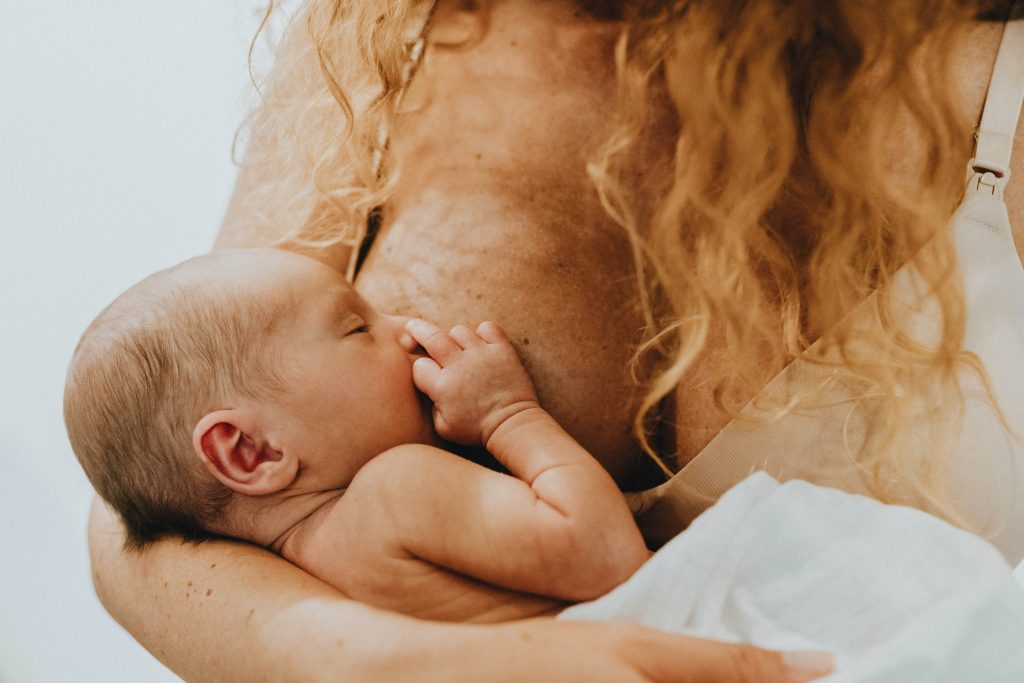Discover how hormonal fluctuations during breastfeeding can impact postpartum back pain.
How Hormonal Fluctuations During Breastfeeding Affect Postpartum Back Pain

Breastfeeding is a wonderful and rewarding experience for new mothers, but it can also bring about some unexpected challenges. One of the most common complaints among breastfeeding moms is postpartum back pain. Yes, you read that right – back pain! Surprising as it may seem, hormonal fluctuations during breastfeeding can have a direct impact on your back. In this article, we will take a closer look at how these hormonal changes affect your body and what you can do to manage and prevent postpartum back pain.
Understanding Hormonal Changes During Breastfeeding
Let’s start by delving into the fascinating world of hormonal changes that occur during breastfeeding. Two key hormones play a significant role in this process: relaxin and progesterone. Both these hormones are responsible for maintaining pregnancy and preparing your body for childbirth. As your body produces breast milk, these hormones continue to fluctuate, affecting various parts of your body, including your back.
But wait, there’s more! Another hormone that goes crazy during breastfeeding is oxytocin. This powerhouse hormone is responsible for stimulating milk production and promoting bonding between you and your baby. While this is fantastic for nurturing that precious mother-baby bond, oxytocin can also impact your back pain levels. It’s like a rollercoaster ride of hormones, and your back is caught in the whirlwind!
Now, let’s take a closer look at relaxin. This hormone, produced by the ovaries and placenta during pregnancy, helps to loosen the ligaments in your body, preparing them for the stretching and shifting that occurs during childbirth. However, relaxin doesn’t just disappear after delivery. It continues to circulate in your body, affecting various joints and muscles, including those in your back.
As relaxin levels remain elevated during breastfeeding, it can contribute to increased flexibility and mobility in your joints. While this can be beneficial in some ways, it can also lead to instability and potential discomfort in your back. The loosening of ligaments can affect the alignment of your spine, causing strain and even pain.
Progesterone, another hormone involved in breastfeeding, also plays a role in the changes your body experiences during this time. Progesterone helps to regulate the menstrual cycle and maintain pregnancy. During breastfeeding, progesterone levels gradually decrease, which can have an impact on your emotional well-being.
Some women may experience mood swings, irritability, or even postpartum depression as progesterone levels fluctuate. These emotional changes can indirectly affect your back health, as stress and tension can contribute to muscle tightness and discomfort.
Now, let’s talk about oxytocin, the hormone often referred to as the “love hormone” or “cuddle hormone.” Oxytocin is released during breastfeeding and promotes a sense of bonding and attachment between you and your baby. It helps create that special connection and strengthens the emotional bond between mother and child.
While oxytocin is primarily known for its role in bonding, it also has physical effects on your body. Oxytocin can cause the uterus to contract, aiding in postpartum recovery and reducing bleeding. However, these contractions can also lead to cramping and discomfort in your lower back.
Additionally, oxytocin can contribute to the let-down reflex, which is the release of milk from the breasts. This reflex can sometimes be accompanied by a tingling or even painful sensation in the breasts, which can radiate to the back and cause discomfort.
So, as you can see, the hormonal changes that occur during breastfeeding are not just limited to milk production. They can have a significant impact on various aspects of your body, including your back. Understanding these hormonal fluctuations can help you better navigate the physical and emotional changes that come with breastfeeding.
The Connection Between Hormones and Back Pain
Now that we understand the hormonal side of things, let’s explore how these hormone fluctuations can contribute to back pain. First up, we have how hormones affect your muscles and ligaments. Relaxin, in particular, loosens the ligaments in your body, making them more flexible. While this is beneficial for childbirth, it can also lead to instability in your back, resulting in discomfort and pain.
But that’s not all. Hormonal imbalances can wreak havoc on your pain thresholds, making your body more sensitive to pain. This means even the slightest strain or muscle contraction can feel like a pinch, or worse, a lightning bolt shooting down your spine. Yikes! It’s like your body has turned into the ultimate pain amplifier, just when you thought breastfeeding was challenging enough.
Now, let’s dive deeper into the fascinating world of hormones and their impact on back pain. Did you know that estrogen, a key hormone in the female reproductive system, plays a significant role in back pain? Estrogen levels fluctuate throughout the menstrual cycle, and these fluctuations can affect the perception of pain. During the menstrual cycle, estrogen levels rise, which can lead to increased sensitivity to pain. This means that even minor back strains or movements that wouldn’t typically cause discomfort can suddenly become unbearable during certain times of the month.
Additionally, progesterone, another hormone involved in the menstrual cycle, can also contribute to back pain. Progesterone levels increase during the second half of the menstrual cycle, and this hormone has been found to have a relaxing effect on smooth muscles, including those in the back. While this relaxation may sound pleasant, it can actually lead to instability in the spine and increased vulnerability to back pain.
Furthermore, the hormonal changes that occur during pregnancy can have a significant impact on back pain. As the body prepares for childbirth, it produces higher levels of relaxin, the hormone responsible for loosening ligaments. This increased flexibility in the ligaments can lead to a shift in the alignment of the spine, potentially causing discomfort and pain in the lower back.
But hormones don’t just affect women. Men also experience hormonal fluctuations that can contribute to back pain. Testosterone, the primary male sex hormone, has been found to play a role in pain perception. Low testosterone levels have been associated with an increased risk of developing chronic pain conditions, including back pain. Additionally, as men age and testosterone levels naturally decline, they may be more susceptible to back pain and other musculoskeletal issues.
So, as you can see, hormones and back pain are closely intertwined. Whether it’s the effects of estrogen and progesterone during the menstrual cycle or the impact of relaxin during pregnancy, hormones can significantly influence the occurrence and intensity of back pain. Understanding these connections can help healthcare professionals develop targeted treatment plans and provide relief to those experiencing hormone-related back pain.
Postpartum Back Pain: A Closer Look
Now that we’ve covered the hormonal rollercoaster, let’s focus on the specifics of postpartum back pain. Understanding the common causes can help you identify the root of your discomfort. One primary culprit is the change in your posture. When you breastfeed, you naturally lean forward to support your little one, putting strain on your back muscles. Add that to the hormonal changes we discussed earlier, and you’ve got a recipe for nagging back pain reminiscing of those sleepless nights.
But what exactly happens to your body during this time? Well, when you breastfeed, your body releases a hormone called oxytocin. This hormone helps with milk production and bonding with your baby, but it also causes your ligaments to become more relaxed. This relaxation, combined with the forward-leaning posture, can lead to muscle imbalances and increased pressure on your spine, resulting in back pain.
Another contributing factor to postpartum back pain is the constant strain from lifting, holding, and carrying your baby. As you adapt to motherhood, you may find yourself in various positions that challenge your back muscles. We all know babies can be little wriggly bundles of joy, so imagine the impact that has on your back when you’re trying to hold them steady for a good feed.
But it’s not just the act of carrying your baby that can cause back pain. The lack of sleep that often comes with being a new parent can also contribute to your discomfort. Sleep deprivation can affect your body’s ability to recover and repair itself, making your back more susceptible to pain and injury.
Additionally, the physical demands of caring for a newborn can take a toll on your overall strength and fitness. During pregnancy, your body goes through significant changes to accommodate the growing baby, and it takes time for your muscles to regain their pre-pregnancy strength. This lack of strength and stability can put extra strain on your back, leading to pain and discomfort.
It’s important to note that postpartum back pain is a common issue, affecting many new mothers. However, it doesn’t mean you have to suffer in silence. There are various treatment options available, including physical therapy, exercises to strengthen your core and back muscles, and ergonomic adjustments to your daily activities.
So, if you’re experiencing postpartum back pain, know that you’re not alone, and there are steps you can take to alleviate your discomfort. By understanding the causes and seeking appropriate treatment, you can get back to enjoying those precious moments with your little one without the distraction of nagging back pain.
Managing Hormone-Related Postpartum Back Pain
Now that you know the ins and outs of hormonal fluctuations and their connection to back pain, it’s time to explore some management strategies. While painkillers may provide temporary relief, we understand that you may prefer non-pharmacological approaches, especially if you’re breastfeeding.
One effective way to manage postpartum back pain is through targeted exercises and physical therapy. Strengthening your back muscles can provide the support they need, reducing discomfort. Be sure to consult with a qualified healthcare professional to develop a safe and effective exercise plan suitable for your postpartum journey.
In addition to exercises, maintaining good posture during breastfeeding is crucial. Remember, your body has undergone tremendous changes during pregnancy, and practicing proper posture can alleviate strain on your back. Consider using supportive pillows and cushions to help you find the most comfortable position for both you and your baby. Comfort is key!
Prevention Strategies for Postpartum Back Pain

Finally, let’s talk about prevention! We know that prevention is always better than cure, and the same goes for postpartum back pain. By adopting these simple strategies, you can reduce your chances of experiencing back pain in the first place.
Start by paying attention to your posture during breastfeeding. Sit up straight, shoulders back, and try not to slouch. Imagine you’re the queen of posture, radiating elegance and confidence. Trust us, your back will thank you for it.
Add strengthening exercises and physical therapy to your daily routine even before the arrival of your bundle of joy. This will help condition your muscles and prepare them for the new challenges they will face as a breastfeeding mom. Being proactive about your health is always a win!
The Beautiful Balancing Act
Yes, breastfeeding comes with its fair share of challenges, and postpartum back pain is undoubtedly one of them. But fear not, new moms! By understanding the hormonal fluctuations and their effects on your back, you can take proactive measures to manage and prevent discomfort. From practicing good posture to targeted exercises, you have a range of options to help you sail through the beautiful balancing act of motherhood without letting back pain steal the joy. So, embrace your journey, cherish those precious moments with your baby, and always remember to give your back the love and care it deserves.



